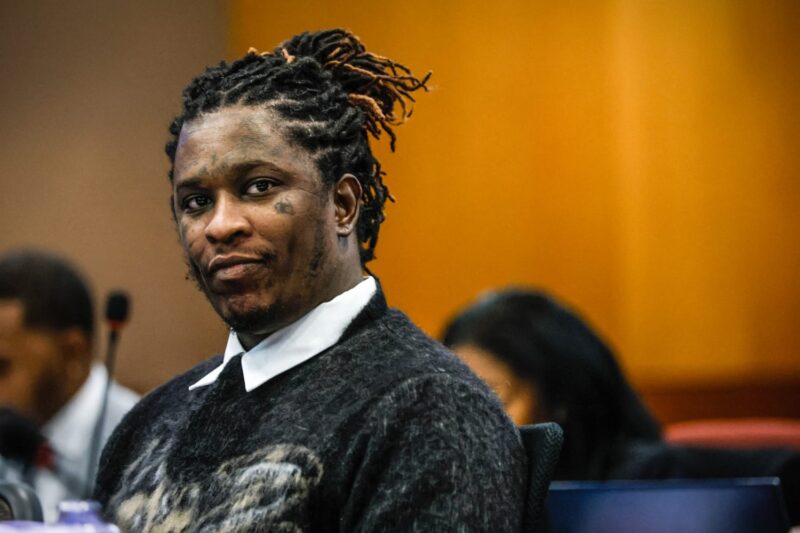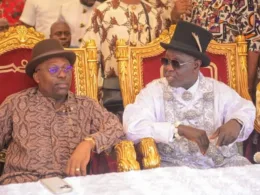Rapper Young Thug, born Jeffery Lamar Williams, is a name long associated with creativity and controversy, but his recent legal admission has shifted public focus.
After a nearly two-year saga, the renowned Atlanta rapper entered a guilty plea on multiple counts in a Fulton County court, acknowledging involvement in gang-related activities, drug offenses, and firearm possession. This decision concludes a high-stakes case under Georgia’s RICO Act that painted Young Thug as a central figure in alleged criminal activities within Atlanta’s streets.
In May 2022, authorities arrested Young Thug alongside 28 others, accusing him of co-founding the Young Slime Life (YSL) street gang. Prosecutors alleged YSL’s role in various illegal activities, from drug trafficking to violent crimes. The indictment involved charges of conspiracy to violate RICO laws and other gang-related activities, with the prosecution also drawing on Young Thug’s lyrics as potential evidence, a point of contention among legal experts and artists alike.
The case began jury selection in January 2023, facing various legal hurdles, including the dismissal of the original presiding judge due to allegations of misconduct. As this case garnered media attention, its prolonged process highlighted Young Thug’s resilience in the public eye and his role in addressing the complex intersections of fame, creativity, and personal battles.
On October 31, 2024, Young Thug appeared in Fulton County Superior Court to enter his plea. He admitted guilt to one gang charge, three drug charges, and two gun-related offenses. He also entered a no-contest plea to an additional gang charge and a racketeering conspiracy charge, indicating acceptance of punishment without further contest. With his admission, he placed the next steps in the hands of Judge Paige Reese Whitaker, who then issued the sentencing decision.
Lead prosecutor Adriane Love emphasized the seriousness of the charges, proposing a 45-year sentence that would include 25 years in prison and a subsequent 20 years of probation. Love argued that the consequences should reflect the severity of the criminal charges and highlighted the effects of gang violence in Atlanta. Representing Young Thug, attorney Brian Steel countered, claiming that the evidence was overstated and his client had opted for a guilty plea to bypass further trial delays, a choice influenced by the rapper’s commitments as a father.
After careful consideration, Judge Whitaker sentenced Young Thug to a total of 40 years. The sentence includes five years credited as time already served, with an additional 15 years on probation, during which strict conditions apply. If Young Thug complies with probation terms, the final 20 years may also be considered as time served, reducing his overall sentence. However, a breach in probation terms could lead to significant additional penalties.
The terms of his probation are notably restrictive. Young Thug must refrain from entering metro Atlanta for the first ten years of his probation, with exceptions limited to specific family gatherings, such as weddings or funerals. His community service requirements include a mandate to complete 100 hours annually and conduct quarterly presentations to educate young people about anti-gang and anti-violence initiatives. Additionally, he is subject to random drug testing and firearm restrictions and must avoid any known gang members or victims linked to his case, with limited exceptions, such as communication with his brother and fellow rapper Gunna due to shared contractual obligations.
The case’s impact on Young Thug’s career is significant yet complex. Despite being detained since 2022, the rapper released his album, “Business Is Business,” in 2023, a testament to his enduring influence and the loyalty of his fan base. This album featured collaborations with prominent artists like Ye (formerly Kanye West) and Ty Dolla Sign, showing Young Thug’s determination to remain present in the hip-hop scene. His ability to maintain relevance amid serious legal challenges underscores both his influence and the challenges artists may face when their artistry intersects with their personal lives.
The case has also reignited debate about using rap lyrics as evidence in court, with many arguing that such practices can infringe upon artistic expression. Critics contend that interpreting lyrics as literal statements risks punishing creative expression rather than criminal behavior, a point of particular significance in hip-hop, where lyrics often reflect experiences and emotions rather than facts. This case has brought discussions about free speech, racial discrimination, and the limitations of the judicial process into the spotlight.
Public reaction to Young Thug’s guilty plea is split. Many supporters see his case as emblematic of broader injustices within the legal system, particularly regarding how Black artists are sometimes treated. Some argue that Young Thug’s contributions to music and culture should not be overshadowed by his legal troubles, while others maintain that accountability is essential, regardless of one’s fame.










Join our Channel...